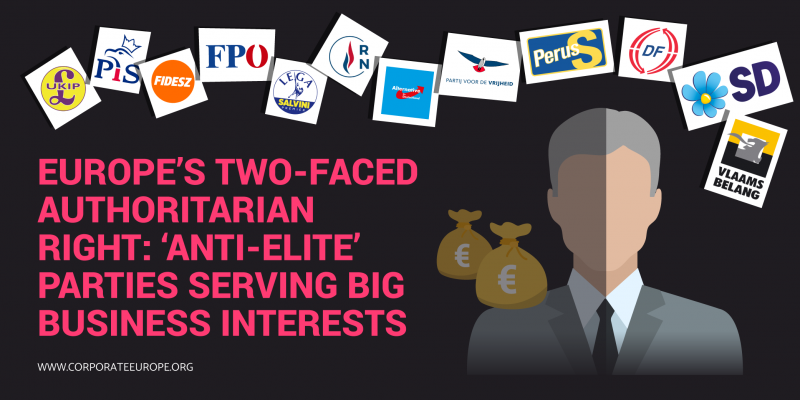
Authoritarian right: Denmark
The Dansk Folkeparti (DF), and some of its most high profile representatives, have been mired in funding controversies for several years.
Click here to read the full report, or check out our methodology and data set
MELD, the Movement for a Europe of Liberties and Democracy, which was the European party of the DF, and its affiliated foundation FELD, previously received large sums of European parliamentary funding. These organisations were led by DF MEP, Morten Messerschmidt, but in 2015 another MEP from the DF resigned, blowing the whistle on the lack of transparency in how its EU funds were being used and how her name had been used on MELD documents without her knowledge.
Danish tabloid Ekstra Bladet ran a series of articles under the lurid title ‘Messer-shit’ to try to get to the bottom of the wrong-doing
Danish tabloid Ekstra Bladet ran a series of articles under the lurid title ‘Messer-shit’ to try to get to the bottom of the wrong-doing, and in 2016 the European Parliament asked MELD and FELD to pay back about €400,000 of EU funding. Allegations included a “money carousel” where MELD’s EU funds were diverted to right-wing politicians in Poland; dubious events in Denmark, Poland and Lithuania; a golden-handshake for a MELD staffer; and party-boat rental. A key allegation, common to other scandals around EU party funding (see Front National and UKIP) is that the money was spent on internal party items or political campaigning, rather than EU level activity. Apparently 60 per cent of the requested funds were repaid by the DF to the European Parliament.
The EU’s anti-fraud agency OLAF has confirmed to Corporate Europe Observatory that it continues to investigate “the alleged misuse of grants paid by the European Parliament” to MELD and FELD, both of which are now bankrupt. Messerschmidt denied the allegations but resigned as leader of the DF group in the European Parliament. Subsequently, there have been reports that he has not cooperated with the OLAF investigation, also denied by the MEP.
Ironically, for many years ‘corruption’ and waste of money in the EU were recurring themes in the rhetoric of the DF. In its 2009 programme, the party states it will “work actively to fight the major weaknesses in the EU institutions in the form of irresponsible management and direct waste of European tax payers’ money, widespread corruption and nepotism”. SidenoteDansk Folkeparti, Arbejdsprogram (work programme), 2009 Meanwhile MEP Messerschmidt has emphasised the matter on numerous occasions. “The EU is an inaccessible parallel universe”, he has said. “The EU doesn’t have to keep an eye on the balance between expenses and income, but can keep on spending without any consideration to others. If people were aware of the shameless waste that is taking place, there would be a revolution.” SidenoteMorten Messerschmidt, speech at the party Congress, October 2012.
In 2017, Danish MP Frank Aaen revealed that the major Danish shipping company A.P. Møller-Mærsk had provided 4 million DKK (over €500,000 in today’s money) to five major political parties including the DF during the 2015 election year. This was at a time when the government was trying to secure a new deal with Mærsk on the tax revenue from North Sea gas exploitation. Few other corporations or rich donors seem prepared to support the DF, although other Danish parties do benefit from such donations.
Accepting corporate money would certainly not be out of tune with DF’s political platform, at least at the EU level, where the votes we studied showed the DF’s broad anti-regulation, anti-worker, pro-big business approach.
DF MEPs voted against 11 of the 14 votes studied
DF MEPs voted against 11 of the 14 votes studied including: paid paternity leave; health and safety at work; action to tackle sugar consumption; corporate profit country-by-country reporting; work-life balance; a proposed directive on ‘decent work’; action on tax evasion; a pan-EU minimum corporate tax rate of 25 per cent; action on gender pay; and on boosting environmental justice. Yet at home, the DF regularly claims to fight against the race to the bottom eg. against so-called social dumping, leading some trade unions to believe that they can count on the party in some crucial labour rights matters.
Click here to read the full report, or check out our methodology and data set
